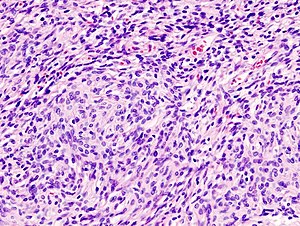Difference between revisions of "Solitary fibrous tumour of the pleura"
Jump to navigation
Jump to search
(→Micro) |
(→IHC) |
||
| Line 80: | Line 80: | ||
*CD99 +ve (23/23 cases<ref name=pmid15460417/>). | *CD99 +ve (23/23 cases<ref name=pmid15460417/>). | ||
*SMA -ve/+ve (7 +ve/23 cases<ref name=pmid15460417/>). | *SMA -ve/+ve (7 +ve/23 cases<ref name=pmid15460417/>). | ||
Others: | |||
*WT1 -ve (+ve in 1 of 10 cases<ref name=pmid18528287>{{Cite journal | last1 = Bing | first1 = Z. | last2 = Pasha | first2 = TL. | last3 = Acs | first3 = G. | last4 = Zhang | first4 = PJ. | title = Cytoplasmic overexpression of WT-1 in gastrointestinal stromal tumor and other soft tissue tumors. | journal = Appl Immunohistochem Mol Morphol | volume = 16 | issue = 4 | pages = 316-21 | month = Jul | year = 2008 | doi = 10.1097/PAI.0b013e31815c2e02 | PMID = 18528287 }}</ref>). | |||
Suggested stains:{{fact}} | Suggested stains:{{fact}} | ||
Revision as of 20:41, 20 February 2014
| Solitary fibrous tumour of the pleura | |
|---|---|
| Diagnosis in short | |
 Pleural solitary fibrous tumour. H&E stain. | |
|
| |
| LM | spindle cells usually with a bland cytology, patternless pattern, +/-ropy collagen |
| LM DDx | CD34 +ve, CD99 +ve, BCL2 +ve, S-100 -ve |
| Site | pleura of lung |
|
| |
| Syndromes | Doege-Potter syndrome |
|
| |
| Signs | +/-impaired respiratory function (due to mass effect) |
| Prevalence | common for site, uncommon overall |
| Prognosis | usu. benign |
| Treatment | surgery |
Solitary fibrous tumour of the pleura, also pleural solitary fibrous tumour, is a relatively common chest wall tumour.
The solitary fibrous tumour in general is dealt with in the solitary fibrous tumour article.
General
- Uncommon overall.[1]
- Common for the anatomical site.
- Usually benign.
- Slow growing.[1]
- Elderly.
- May be large - impair respiratory function.[2]
- May be associated with hypoglycemia.
- Known as Doege-Potter syndrome.[3]
Gross/radiology
- Chest wall mass.
Microscopic
Features:
- Spindle cells - usually bland cytology.
- Patternless pattern.
- +/-Ropy collagen.
- Staghorn vessels.
Suggestive of malignant:[2]
- Mitotic rate >4/10 HPF.
- Definition suffers from HPFitis.
DDx:
- Malignant mesothelioma.
- Metastatic carcinoma.
- Lung adenocarcinoma.
Images
www:
IHC
Features:
- CD34 +ve (19/23 cases[4]).
- Ki-67 low (<5%).[2]
- Vimentin +ve (23/23 cases[4]).
- BCL2 +ve (23/23 cases[4]).
- CD99 +ve (23/23 cases[4]).
- SMA -ve/+ve (7 +ve/23 cases[4]).
Others:
- WT1 -ve (+ve in 1 of 10 cases[5]).
Suggested stains:[citation needed]
- CD34, CD99, BCL2, S-100, Ki-67.
Sign out
LEFT LUNG ("LARGE PLEURAL BASED MASS"), BIOPSY:
- SOLITARY FIBROUS TUMOUR.
Micro
The sections show cellular fibrous tissue with a patternless pattern. Rare staghorn vessels are present. No mitotic activity is readily apparent. No significant nuclear atypia is identified. No necrosis is apparent.
See also
References
- ↑ 1.0 1.1 Mordenti, P.; Di Cicilia, R.; Delfanti, R.; Capelli, P.; Paties, C.; Cavanna, L.. "Solitary fibrous tumors of the pleura: a case report and review of the literature.". Tumori 99 (4): e177-83. doi:10.1700/1361.15120. PMID 24326857.
- ↑ 2.0 2.1 2.2 Abe, M.; Nomori, H.; Fukazawa, M.; Sugimura, H.; Narita, M.; Takeshi, A. (Oct 2013). "Giant Solitary Fibrous Tumor of the Pleura Causing Respiratory Insufficiency: Report of 3 Cases.". Ann Thorac Cardiovasc Surg. PMID 24088920.
- ↑ Roy, TM.; Burns, MV.; Overly, DJ.; Curd, BT. (Nov 1992). "Solitary fibrous tumor of the pleura with hypoglycemia: the Doege-Potter syndrome.". J Ky Med Assoc 90 (11): 557-60. PMID 1474302.
- ↑ 4.0 4.1 4.2 4.3 4.4 Chen, HJ.; Zhang, HY.; Li, X.; Guo, LX.; Wei, B.; Guo, H.; Bu, H.; Yang, K. et al. (Sep 2004). "[Solitary fibrous tumor: the clinicopathologic and immunohistochemical characteristics of 26 cases].". Sichuan Da Xue Xue Bao Yi Xue Ban 35 (5): 675-9. PMID 15460417.
- ↑ Bing, Z.; Pasha, TL.; Acs, G.; Zhang, PJ. (Jul 2008). "Cytoplasmic overexpression of WT-1 in gastrointestinal stromal tumor and other soft tissue tumors.". Appl Immunohistochem Mol Morphol 16 (4): 316-21. doi:10.1097/PAI.0b013e31815c2e02. PMID 18528287.


